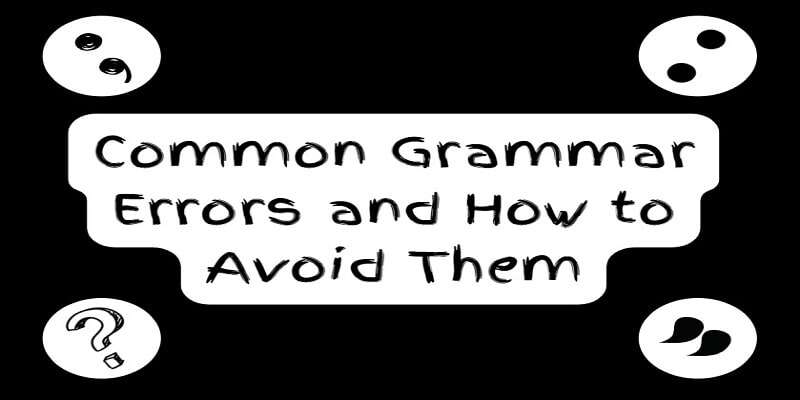Common Grammar Errors and How to Avoid Them
Common Grammar Errors and How to Avoid Them

Today we will learn Common Grammar Errors and How to Avoid Them – Almost every writer has that one special type of signature grammar error that they are more prone to make than others. Some people may have trouble with possessive nouns whereas others may have difficulty keeping dangling modifiers out of their writing.
In this blog post, we’re going to be taking a look at some common grammar errors and how you can avoid them. If you find an error in the list that you frequently make in your write-ups, give it some special attention.
Lets’ get started.
Nope, that’s wrong.
Let’s get started.
Common Grammatical Mistakes and How to Avoid Making Them
When discussing each error/mistake, we’ll also give a couple of examples so that you can get a better understanding.
1. Comma Splices
A comma splice is a grammatical error in which two independent clauses are joined using a comma instead of a conjunction, semi-colon (;) or colon (:).
Here is an example of a comma splice:
The man got scared of the lizard, it kept coming close to the desk. (Incorrect)
The man got scared of the lizard as it kept coming close to the desk. (Correct)
In the example, the two clauses i.e., “The man got scared of the lizard…” and “…it kept coming close to the desk…” can exist on their own. Since they are independent, they need to have a conjunction in between, or a colon/semi-colon. We could also break them both away completely using a period. That would also be grammatically correct i.e.:
The man got scared of the lizard. It kept coming close to the desk. (Correct)
Let’s look at another example:
The person needed to go to the store, he wanted to buy some milk. (Incorrect)
The person needed to go to the store; he wanted to buy some milk. (Correct)
How to Avoid This Error?
The simplest way to avoid this error is to check whether the two clauses on either side of the comma are independent or dependent. If they are dependent, the comma is fine. If they are independent, you will have to use something else.
At first, it may be difficult for you to detect this sort of grammatical error in your writing, but you will gradually learn how to find it.
However, until you get used to spotting this error in your write-ups, you should take the help of a comma checker. Comma checkers, more broadly referred to as grammar checkers, can find comma splices in your text and point them out clearly.
However, when selecting a comma checker, you have to make sure that you pick a reliable one that is trusted and used by a considerable number of online users.
2. Mixing Lying and Laying
Some people can mix up ‘lying’ and ‘laying’, especially when they have to refer to someone having a rest or getting some sleep. We’ll explain this one in some detail before moving on to look at the examples.
When we talk about ‘laying’, it refers to the act of putting or setting something down (there are other definitions for ‘laying’ as well, but we’re dealing with a specific context here).
On the other hand, when we talk about ‘lying’, it either refers to telling a falsehood or being in a horizontal position on a surface i.e. a bed or a couch.
‘Laying’ is used with an object. In other words, when using the word ‘laying’, we take a subject and an object.
We could, for example, say that “The mother laid [the past form of ‘lay’] the baby in the cot…” In this example, the ‘mother’ is the subject and the ‘baby’ is the object. (…in the grammatical sense…a baby is actually not an object…it’s a human being.)
However, ‘lying’ does not require an object. A subject suffices. For example, if we say “…Brian was lying down…”, then this is grammatically correct.
Here are a couple of examples of this error:
The boy was laying down on the bed. (Incorrect)
The boy was lying down on the bed. (Correct)
The father was lying the baby on the mattress. (Incorrect)
The father was laying the baby on the mattress. (Correct)
How to Avoid This Error?
Avoiding this error is easy. If you want to refer to someone resting in a horizontal position on a surface, you’ll use the word ‘lying’ or ‘lie’. But, if you want to refer to someone putting something down on a surface, then you will refer to this act as ‘laying’ or ‘laid’.
3. Squinting Modifiers
A squinting modifier is a grammatical error that occurs when it is unclear which phrase in a sentence is being affected by a modifier. It can be a little confusing to understand as a definition so here’s an example:
He was walking carefully following the tracks of the wounded deer. (Incorrect)
He was walking carefully, following the tracks of the wounded deer. (Correct)
In the incorrect version of the example, the word ‘carefully’ could be modifying the phrase before it i.e., “He was walking carefully…” or the one after it “…following the tracks of the wounded deer.” But, in the correct version, the use of the comma separates both phrases, due to which it becomes clear that the modifier is for the first part of the sentence.
How to Avoid This Error?
Squinting modifiers can be a little hard to avoid…solely due to the fact that they can be hard to understand and detect. It either takes a sharp proofreader or a reliable grammar-checking software to spot them.
This error occurs in a sentence that has two or more different phrases that can be affected by a modifier. Hence, whenever you want to write such a sentence, you should use a comma to separate both phrases along with their respective modifiers. Here is another example that illustrates this point a little better:
The man coughed loudly quickly clapping his hand to his mouth. (Incorrect)
The man coughed loudly, quickly clapping his hand to his mount. (Correct)
Although no one will probably come up with a sentence, as shown above, the example helps us understand how using a comma at the right place distributes the modifiers to their respective phrases.
4. Incorrect Use of Pronouns
Writers can make this sort of error when they’re writing in a flow and are not really paying attention to what they are actually typing.
Incorrect use of pronouns essentially refers to when the utilization of words like ‘they’, ‘him’, ‘her’ and ‘it’ is done in a confusing way.
For example, take this sentence:
Harry, along with his brother, was going to his sister’s house when he met Smith who was going to his mother’s house. He invited him to her house and suggested that they could later go to her house after they had had their supper. (Atrociously incorrect)
Does the above couple of sentences make any sense? They don’t. It’s just a jumble of hims and hers and thems.
If we were to write this correctly, it would look something like this:
Harry, along with his brother, was going to his sister’s house when he met Smith who was going to his mother’s house. Harry invited Smith to his sister’s house and suggested that they could both go to Smith’s mother’s home after having supper. (Somewhat correct)
To be fair, we didn’t actually pick the best sentences to illustrate this error but we think we got the point across. Here is another slightly less complicated example:
Harry was talking to his mother, but he was distracting him by jumping at the window. (Incorrect)
Harry was talking to his mother, but this brother was distracting him by jumping at the window. (Correct)
How to Avoid This Error?
To avoid making a mess of the pronouns, you should repeat the subject’s name to refer to their action or possession etc. Or, you can just keep the sentences short and break them up to avoid confusion.
5. They’re and Their
This error is typically committed more in speech rather than in writing.
‘They’re’ is short for ‘they are’ whereas ‘their’ is a possessive determiner used for referring to something belonging to two or more people.
Here is an example of incorrect usage of these two words:
They’re van is standing outside the house but their inside, talking. (Incorrect)
Their van is standing outside the house but they’re inside, talking. (Correct)
Here is another one:
Their going to go to the other house soon with all they’re belongings. (Incorrect)
They’re going to go to the other house soon with all their belongings. (Correct)
How to Avoid This Error?
Whenever you want to mention an action being done by two or more people, use the word “they’re”. On the other hand, when you want to attribute the possession of something to a group of people, use “their”.
Conclusion
So, there you have it. These were some common grammar errors that you can look out for in your writing. Mind you, it’s not easy to spontaneously spot your errors, so you have to take the help of a human editor, or a grammar-checking tool.
We hope that you got Common Grammar Errors and How to Avoid Them.
Read also –




